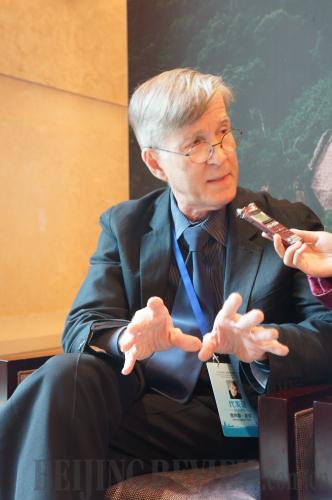|
 |
|
James Peck(ZHANG XUE) |
Senior U.S. Historian James Peck said the 21st Century Maritime Silk Road proposed by China is a reflection of an enormous transformation in the global order from a unipolar to a multipolar world.
"The Silk Road initiative is part of this historic transformation. It's an inevitable trend," Peck told Beijing Review when attending the International Seminar on the 21st Century Maritime Silk Road Initiative in Fuzhou, southeast China's Fujian Province, on February 11.
Peck is the publisher of US-China Book Design Press and currently teaches on U.S. foreign policy in Asia and the Cold War in Asia at New York University.
He said countries along the proposed 21st Century Maritime Silk Road can definitely benefit from the trade route.
Economic development among these countries as well as cultural understanding and respect for each other is something that can create a certain energetic vitality among countries which historically share links but had not been able to cooperate economically, given the structure of the international order. The synergic development among those countries will offer an opportunity both for them and for world development, he said.
Peck also said the 21st Century Maritime Silk Road is not an imitation of the Marshall Plan. Officially known as the European Recovery Program, the Marshall Plan invested $17 billion in the rebuilding and bolstering of European economies after World War II.
"Unlike the Marshall Plan, which is very politically directed in the European context to undercut all sorts of political opposition groups in Europe, the Silk Road initiative is more about opening up relationships with other diverse cultures economically and politically without demanding that they conform to Chinese standards and methods," Peck told Beijing Review.
Peck said a major difference between the United States and China lies in the fact that the former has traditionally required that society should be more or less alike, or at least compatible, whereas the latter has embodied a very different approach toward the world, with a much more tolerant perspective for diverse cultures.
"In the one sense, it's like the Marshall Plan in that it can be very generous and open and can create all sorts of economic possibilities, but it's not driven by that hard-edge narrow political agenda," Peck said.
| 